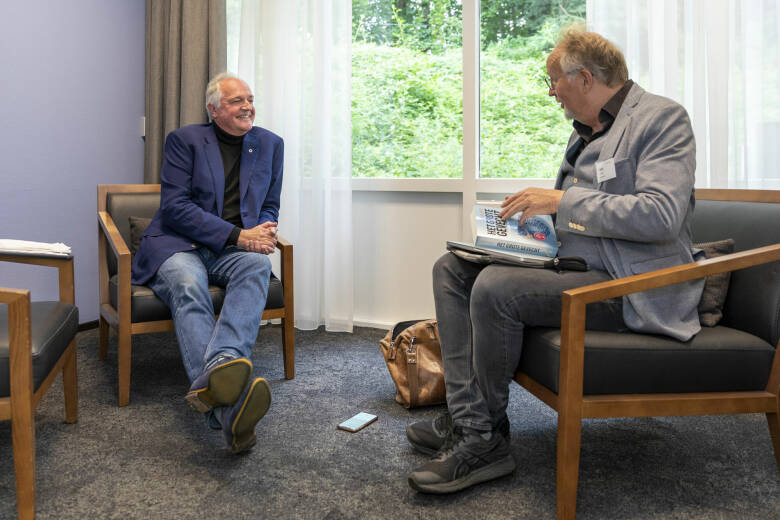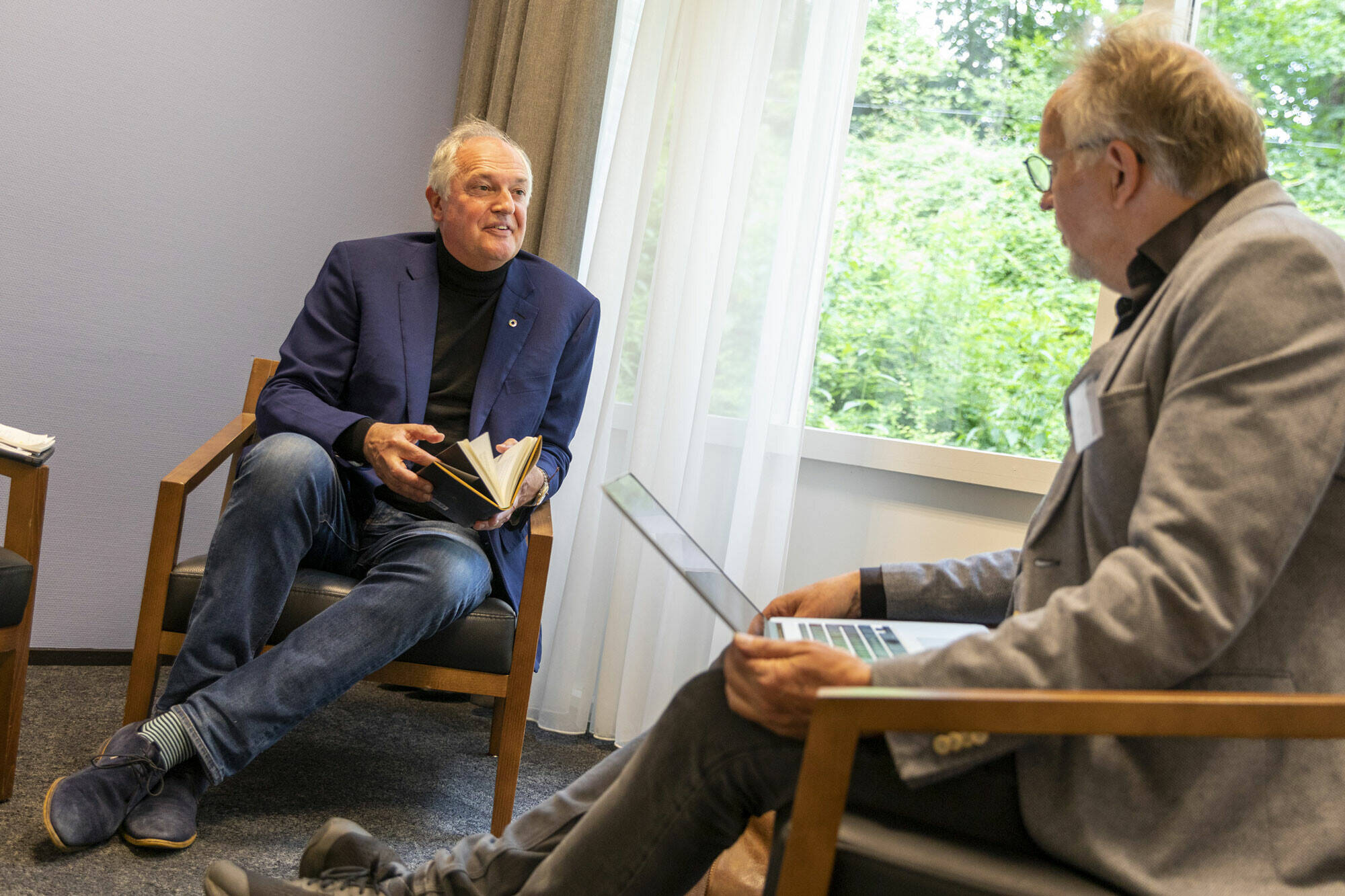


Can companies do the right thing and still be successful?
“My latest book is called 'Net Positive. How companies thrive by giving more than taking'. You can perform better by giving more than taking. A net positive company improves the well-being of all stakeholders: employees, suppliers, customers, communities and even future generations, wherever the company operates. That’s the compass we should navigate with, our True North. Is the world better off with our company, or not? That’s the fundamental question. It’s a strong religious aspect, a Samaritan concept. If companies start thinking about how they can be a greater positive force in society – just as the first vegan products showed you can do without meat – then you become a net positive company.”
“The same principle also applies to people. People who live happy lives – and more often a long life – are people who give more than they take. How often do you want to go to the cafe with a friend who never pays? Giving means listening to others, helping others, putting others first in decisions. If you give more than you take, there will be infinite possibilities. You will be more successful.”
“That was the real reason behind Unilever's success. We were able to work with more people, we started working with new countries, with companies that wanted to be connected to us. If you have that mentality, a lot of good things are going to happen. The corporate world is a collection of people. The reason we misbehave is that we have a system with bad incentives and rules. We have to change those rules. That's what I focus on.”
“Taking care of my children, taking care of safety, ensuring a good education, respecting nature. I think those things are important. I can’t let those values go, just because I'm at work? Research shows that 15% of all employees are engaged and 85% are not. Because the company's values do not align with employees' personal values. That makes no sense, does it? When you create shared values, you unlock magic. All of a suddan people can move mountains, they can do ten times more than they ever thought. That combined energy is amazing. That's what purpose is. That's what life should be like."
What does 'purpose' mean to you?
“For me, teachers are examples of purpose-driven people. Their main goal is to make people better than they are themselves. In our project 'Kilimanjaro Blind Trust' we help 25,000 deaf and blind children from Africa with school. The teachers who teach these children are not paid much. They are fully committed to giving them a better life. There is total dedication. These people are the happiest people in the world. It is the satisfaction of giving. The Biblical Story of the Good Samaritan and the Beggar. Who got the greatest satisfaction: the beggar who got the money or the Samaritan who gave it away? I would say that the gift of giving is the greatest satisfaction. Giving gives me energy so that I can work even harder on important matters. Maybe more than others, but that's okay. I'm not more important because I'm in the paper with heads of state or whomever. Most importantly, we are all needed on this journey. And we all do it in our own way. Can you truly say that you left the world in a better state than you found it? Can you say that you have positively influenced people, that you have tried to live a good life? In every religion you will find: 'Do as you would be done by'. I extend that golden rule to include the planet. "What you don't want done to you and the planet, don't do to others and the planet."
Who or what is your source of inspiration?
“We all have the same 24 hours. I've been fortunate in my career to gain knowledge about how to fill those 24 hours in a way that makes sense. The results I achieve make the energy I put in my work worthwhile. That motivates me. Also, I work with people I like. I focus on the things where I can make a big difference. Working in a way that brings joy. I realize that this is a hugely privileged position. People could say to me: don't you want to go sailing in Greece, enjoy your money and play golf? But isn't it a privilege to help other people and leave the world in a better state? Isn't that satisfying? In a way it's even selfish. I've found that the more I provide people with chances, the better I feel about myself. The satisfaction is really greater than if I were to hit a good ball while playing golf. It is a privilege to have money that you can give to others. The money belongs to the world after all. It is a privilege to share knowledge. And I have plenty of opportunities to relax with my family. I also like a good movie or a jazz concert to come up for some air.”
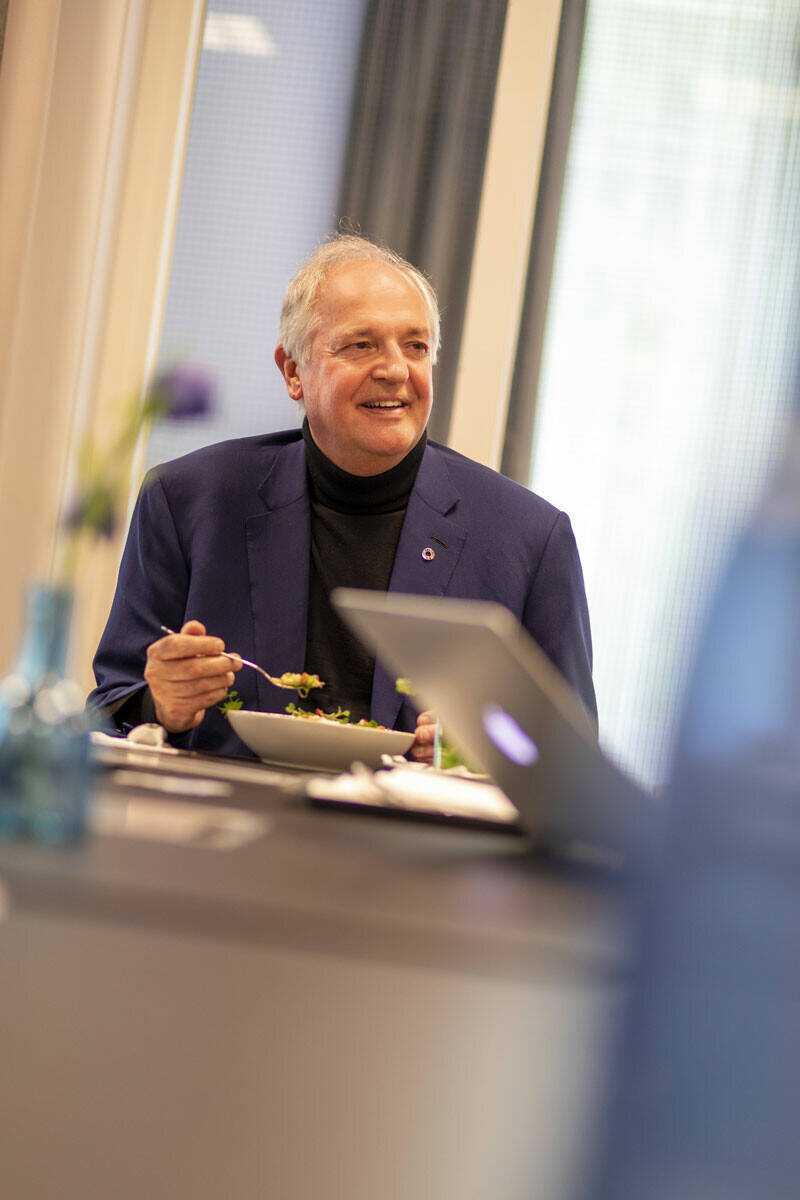
What’s your message for food professionals? How can small companies also take responsibility?
“I get it when people say: I'm just one of the billions of people in the world. What difference can I make? Well, you could change the way you eat; more plant-based and less meat. You can positively influence the people around you. You can vote for a political party that is working on solutions. You could stop buying and serving certain products. You can make your voice heard like Greta Thunberg does. History has shown that changes always start with the individual. Nelson Mandela who came out of prison and achieves reconciliation; Rosa Parks who refused to stand up for a white American on the bus and ended segregation; Gandhi standing up and liberating India. You can be that individual on a local level in your own community, or on a national level, it doesn't matter. If you think one person can't make a difference, go to bed with a mosquito in your bedroom. A little thing can make a big difference.”
“The world's Food production highly decentralized. Even if you add up all the major food producers in the world, they provide less than 10% of the food. Even Unilever is small compared to all the companies in the world. But don't let that stop you. We have shown that you can combat deforestation by increasing the farmer's yield with sustainable farming methods that provide you with better products for a better price. That's why you should also look at chefs. All innovative trends happen in small companies. We talked to chefs to find out what was going to happen on the menus. Working with quinoa or cabbage, that started with chefs. It's amazing how innovative and passionate chefs are. For some of them, preparing and eating vegetables is the same as making love. Because of that passion, the greatest growth is in small companies that focus on organic, local or vegan. Large companies have to go along, otherwise they will become redundant.”
Changing financial markets is like changing the course of a super tanker. Are you hopeful?
“Just like you don't have good governments or good NGOs everywhere, you don't have good companies everywhere. At first I was frustrated that not everyone wanted to move forward, but I've come to realize that I am more useful and effective when I focus on the 20-30% of the companies that are responsible. If they form an example that change is possible in a profitable way, then you can convince politicians to announce courageous measures. And forces the rest to follow. I am not so naive that business will solve everything, or that innovation is the only answer. We will need a combination of responsible companies that are credible and trustworthy and conscious citizens and activists who continue to draw attention to the burning issues. And eventually politicians will have to change the rules. If they don't, change will be very difficult.”
Will technology help us?
“Technology will certainly help us. The growth of technological performance is exponential. For example, look at wind and solar energy. In 2014, the International Energy Agency predicted that by 2050 a green kilowatt hour would cost five cents. We have already reached that price in 2020. They also predicted that the electric car would be as cheap as the combustion engine by 2050. We will achieve that in 2026, possibly even earlier. It’s this combination that will help us to be successful: our growing awareness and will to change things in combination with solutions will be provided with technology.”

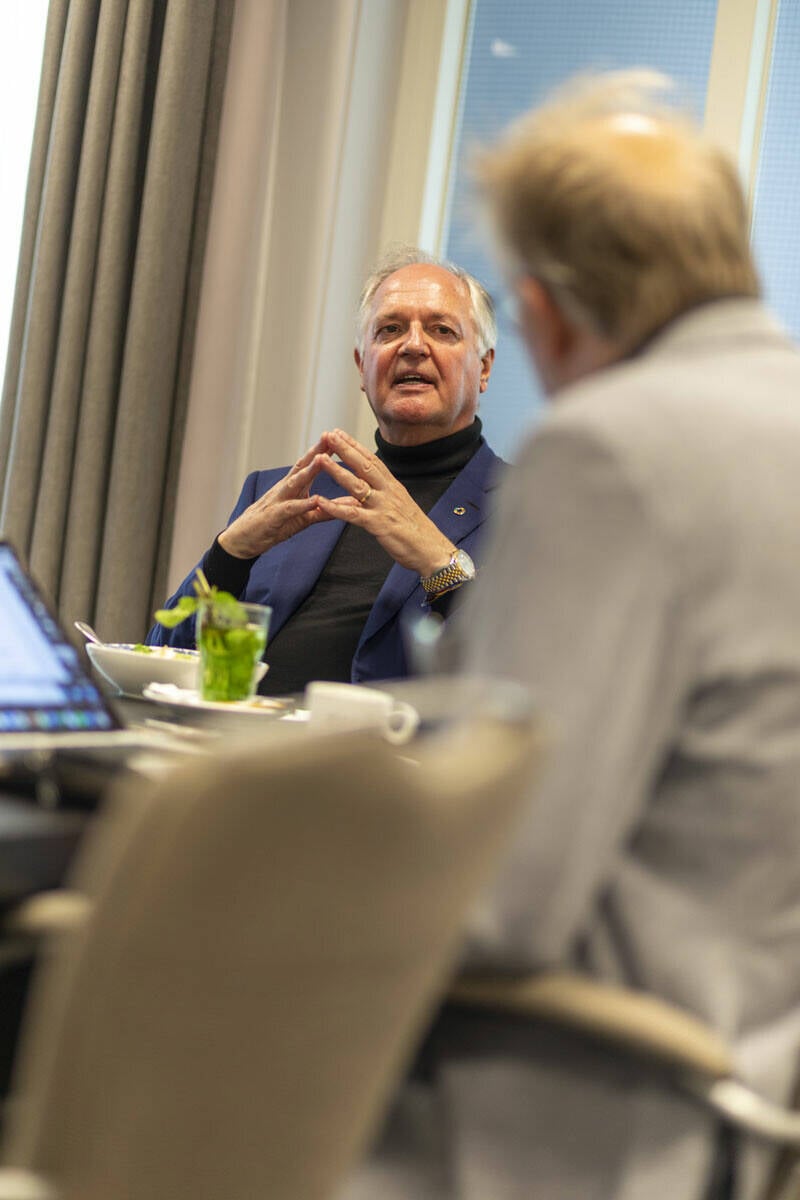
The debate is also increasingly about doing business within the planetary boundaries.
“We’re understanding now that we’re close to negative tipping points. We've never been this close before. As you know, the oceans are important in combating climate change – they absorb 80% of our CO2. But the current situation is causing acidification, which is destroying coral reefs and threatening entire fish stocks. The melting of polar ice, the release of methane that is 25 times more harmful to warming than CO2. And I haven’t even touched upon the disappearance of flora and fauna. 68% of all wildlife has disappeared in the last fifty years. Only now are we understanding the magnitude of our problems. Everything is connected and we’re starting to realize the urgency of the situation.
Our eyes are opening to the fact that the jungle in the Amazon – which is deforested at two football fields per second – is approaching a negative turning point: the point is approaching that the jungle will no longer absorb CO2 but start emitting it. Once a tipping point is reached, these negative effects are very difficult to control. The richer parts of the world are robust and have the money for the necessary adjustments, but many other people in the world are going to pay the bill. Fortunately, we also realize that solutions are within our reach. After COVID-19, we saw that a trillion dollars is normal for aiding programs like improving infrastructure in the US. With less money we can solve the issues of inequality and the planet. But if we don't make fundamental progress in the next ten to fifteen years, the price we have to pay will be much higher.”
"For too long we've made marginal improvements that don't seem to work; the system is pushing back because we don't see any progress. Today, we see more courageous people rising up who want to engage in important discussion. How do you make the financial market serve the real economy again? How do you get the financial market to think long term? How do you value social and ecological capital? How do you organize transparency, so that companies and people can be held accountable? Should companies only answer to shareholders or to all stakeholders? I strongly believe in the latter. These fundamental debates are taking place today.”
The next ten years are said to be the most important decade of mankind. What’s your view on that statement?
“I would rather say: the next decade will define our future. Each decade can be characterized in one area or the other, as the most important in history. But this decade will be decisive. There is a small window of opportunity to evolve capitalism into a system that works better for many more people and for the entire planet. We need to introduce a new definition of success and start measuring it. We need to broaden the narrow definition of Gross Domestic Product or profit and include the well-being of all stakeholders. We should move away from the reward on capital that too few people benefit from. Citizens have been aware of these problems for a while, but we can now see that the financial market, companies and responsible governments are ready to think about what major changes need to take place in our system."

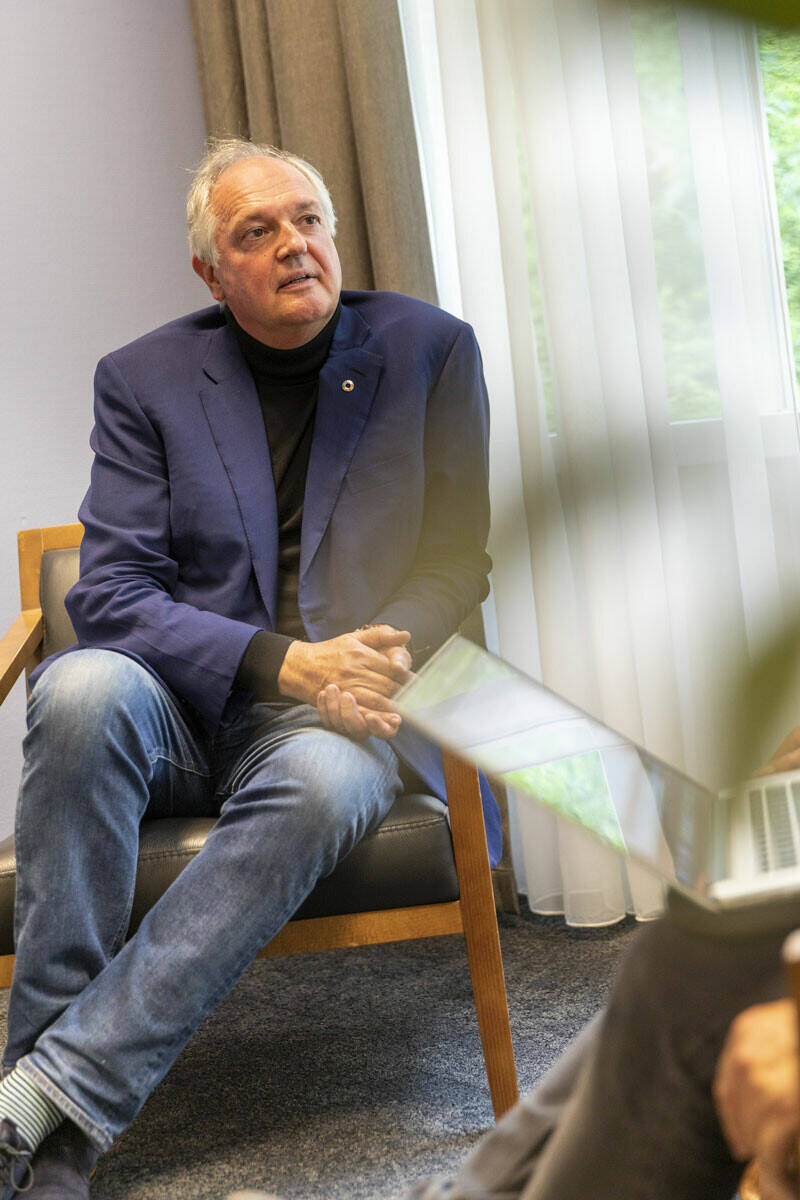
Captain Planet (Polman’s nickname)
“I've always been concerned about inequality and climate change. In 2015 I received the United Nations' highest honor – the Champions of the Earth Award. I think that's where the nickname comes from. Captain Planet is a cartoon character in the US. I don’t object to this nickname. I use it as an avatar. What are your superpowers to make the Earth better and what can you do? It's not that I'm better than anyone else, but sometimes you get into positions that allow you to exert more influence. When I was CEO of Unilever, I had the opportunity to positively impact more lives than when I wasn't there. I've always thought that if we did the right thing for 'people' and 'planet', then success for Unilever would follow. And that was right. What can we do to improve the faith of people in India and Africa, sustainably? If we figure that out first, there are plenty of smart people who can then turn it profitable.”


Enschede (hometown of Polman, city in The Netherlands)
“My father always said: don't forget the number of your house. I've had fantastic parents, they laid the foundations for the rest of my life. My primary and secondary school, the Carmelite Fathers at Jacobus College, also shaped me. Just like my circle of friends from that time, whom we still get together with, once a year. Whether my True North is in Enschede? I'm proud to be a tukker (Dutch word for people from the area of Enschede). You should keep two feet on the ground. You have to stay down to earth, it's not about me. My grandmother always said: 'actions speak louder than words'. Work hard, just keep going, do the things you need to do in a simple way. Don't make promises, just work."
The United Nations Sustainable Development Goals (SDGs)
“The best business plan ever presented to humanity on a silver platter. Implementing SDGs in your business provides much more opportunities than many companies could imagine. But you have to be able to understand the goals. The framework also functions as a moral compass. You can say that the SDGs showcase humanity’s shortcomings, on the other side they show the possibilities that the framework offers. For the first time in history there’s a universal plan to permanently eradicate poverty in a sustainable and reasonable way. The starting point is - to put it simply: 'Leave no one behind'. If you want the world to function properly, you can't leave anyone behind. That doesn’t mean that everyone has an equal position, but you shouldn't leave anyone behind. In any system in which people don’t participate or are abandoned, rebellion arises. Discontent in the streets is already visible in the streets. The SDGs are a beacon that everyone should familiarize themselves with.”
Economist Milton Friedman (promoter of unadulterated capitalism with minimal government intervention)
“First thing that comes to mind? Milton Friedman is dead. And that observation is also meant symbolically. My second hunch is, if Milton Friedman was born today, he wouldn't be writing the same book with the same ideas as he did back then. The issues in his time were fundamentally different. Businesses were much more locally oriented and governments functioned better. Many issues of today – such as increasing inequality and working within planetary boundaries – moved in the right direction then. Friedman would now see that the best way to build shareholder value is to take care of all your stakeholders.”

Let's start with your response to some keywords:
Paul Polman, Unilever’s CEO from 2008 to 2019. He’s known for his huge work ethic and commitment to sustainability. Today he is active with his foundation, Imagine, that aims to save the world from inequality, climate change and loss of biodiversity. Companies, especially food companies, have a special responsibility, according to Polman. His book 'Net Positive — How courageous companies thrive by giving more than they take’ has just been published. Hans Steenbergen spoke with him exclusively for Food Inspiration.
Hans Steenbergen Nathalie Brugman Xiao Er Kong

interview
14 min


Can companies do the right thing and still be successful?
“My latest book is called 'Net Positive. How companies thrive by giving more than taking'. You can perform better by giving more than taking. A net positive company improves the well-being of all stakeholders: employees, suppliers, customers, communities and even future generations, wherever the company operates. That’s the compass we should navigate with, our True North. Is the world better off with our company, or not? That’s the fundamental question. It’s a strong religious aspect, a Samaritan concept. If companies start thinking about how they can be a greater positive force in society – just as the first vegan products showed you can do without meat – then you become a net positive company.”
“The same principle also applies to people. People who live happy lives – and more often a long life – are people who give more than they take. How often do you want to go to the cafe with a friend who never pays? Giving means listening to others, helping others, putting others first in decisions. If you give more than you take, there will be infinite possibilities. You will be more successful.”
“That was the real reason behind Unilever's success. We were able to work with more people, we started working with new countries, with companies that wanted to be connected to us. If you have that mentality, a lot of good things are going to happen. The corporate world is a collection of people. The reason we misbehave is that we have a system with bad incentives and rules. We have to change those rules. That's what I focus on.”
“Taking care of my children, taking care of safety, ensuring a good education, respecting nature. I think those things are important. I can’t let those values go, just because I'm at work? Research shows that 15% of all employees are engaged and 85% are not. Because the company's values do not align with employees' personal values. That makes no sense, does it? When you create shared values, you unlock magic. All of a suddan people can move mountains, they can do ten times more than they ever thought. That combined energy is amazing. That's what purpose is. That's what life should be like."
What does 'purpose' mean to you?
“For me, teachers are examples of purpose-driven people. Their main goal is to make people better than they are themselves. In our project 'Kilimanjaro Blind Trust' we help 25,000 deaf and blind children from Africa with school. The teachers who teach these children are not paid much. They are fully committed to giving them a better life. There is total dedication. These people are the happiest people in the world. It is the satisfaction of giving. The Biblical Story of the Good Samaritan and the Beggar. Who got the greatest satisfaction: the beggar who got the money or the Samaritan who gave it away? I would say that the gift of giving is the greatest satisfaction. Giving gives me energy so that I can work even harder on important matters. Maybe more than others, but that's okay. I'm not more important because I'm in the paper with heads of state or whomever. Most importantly, we are all needed on this journey. And we all do it in our own way. Can you truly say that you left the world in a better state than you found it? Can you say that you have positively influenced people, that you have tried to live a good life? In every religion you will find: 'Do as you would be done by'. I extend that golden rule to include the planet. "What you don't want done to you and the planet, don't do to others and the planet."
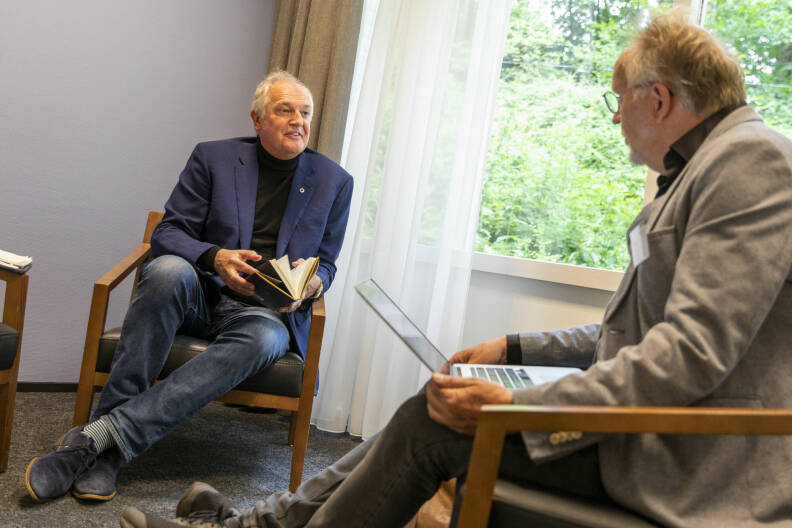


Who or what is your source of inspiration?
“We all have the same 24 hours. I've been fortunate in my career to gain knowledge about how to fill those 24 hours in a way that makes sense. The results I achieve make the energy I put in my work worthwhile. That motivates me. Also, I work with people I like. I focus on the things where I can make a big difference. Working in a way that brings joy. I realize that this is a hugely privileged position. People could say to me: don't you want to go sailing in Greece, enjoy your money and play golf? But isn't it a privilege to help other people and leave the world in a better state? Isn't that satisfying? In a way it's even selfish. I've found that the more I provide people with chances, the better I feel about myself. The satisfaction is really greater than if I were to hit a good ball while playing golf. It is a privilege to have money that you can give to others. The money belongs to the world after all. It is a privilege to share knowledge. And I have plenty of opportunities to relax with my family. I also like a good movie or a jazz concert to come up for some air.”
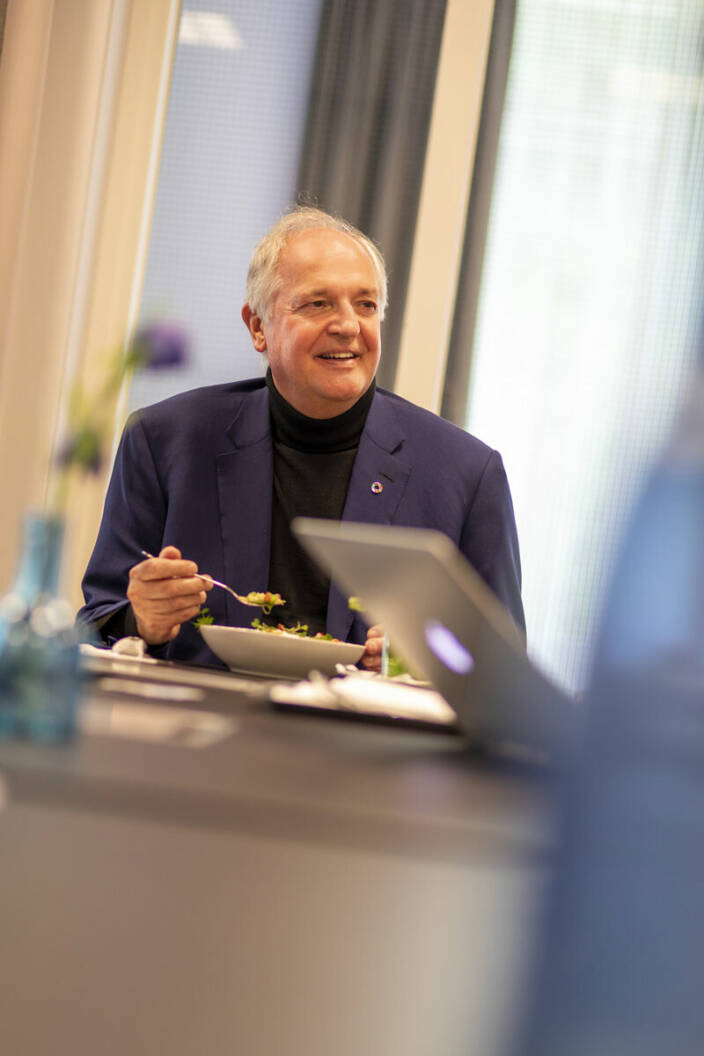
What’s your message for food professionals? How can small companies also take responsibility?
“I get it when people say: I'm just one of the billions of people in the world. What difference can I make? Well, you could change the way you eat; more plant-based and less meat. You can positively influence the people around you. You can vote for a political party that is working on solutions. You could stop buying and serving certain products. You can make your voice heard like Greta Thunberg does. History has shown that changes always start with the individual. Nelson Mandela who came out of prison and achieves reconciliation; Rosa Parks who refused to stand up for a white American on the bus and ended segregation; Gandhi standing up and liberating India. You can be that individual on a local level in your own community, or on a national level, it doesn't matter. If you think one person can't make a difference, go to bed with a mosquito in your bedroom. A little thing can make a big difference.”
“The world's Food production highly decentralized. Even if you add up all the major food producers in the world, they provide less than 10% of the food. Even Unilever is small compared to all the companies in the world. But don't let that stop you. We have shown that you can combat deforestation by increasing the farmer's yield with sustainable farming methods that provide you with better products for a better price. That's why you should also look at chefs. All innovative trends happen in small companies. We talked to chefs to find out what was going to happen on the menus. Working with quinoa or cabbage, that started with chefs. It's amazing how innovative and passionate chefs are. For some of them, preparing and eating vegetables is the same as making love. Because of that passion, the greatest growth is in small companies that focus on organic, local or vegan. Large companies have to go along, otherwise they will become redundant.”
Changing financial markets is like changing the course of a super tanker. Are you hopeful?
“Just like you don't have good governments or good NGOs everywhere, you don't have good companies everywhere. At first I was frustrated that not everyone wanted to move forward, but I've come to realize that I am more useful and effective when I focus on the 20-30% of the companies that are responsible. If they form an example that change is possible in a profitable way, then you can convince politicians to announce courageous measures. And forces the rest to follow. I am not so naive that business will solve everything, or that innovation is the only answer. We will need a combination of responsible companies that are credible and trustworthy and conscious citizens and activists who continue to draw attention to the burning issues. And eventually politicians will have to change the rules. If they don't, change will be very difficult.”
Will technology help us?
“Technology will certainly help us. The growth of technological performance is exponential. For example, look at wind and solar energy. In 2014, the International Energy Agency predicted that by 2050 a green kilowatt hour would cost five cents. We have already reached that price in 2020. They also predicted that the electric car would be as cheap as the combustion engine by 2050. We will achieve that in 2026, possibly even earlier. It’s this combination that will help us to be successful: our growing awareness and will to change things in combination with solutions will be provided with technology.”

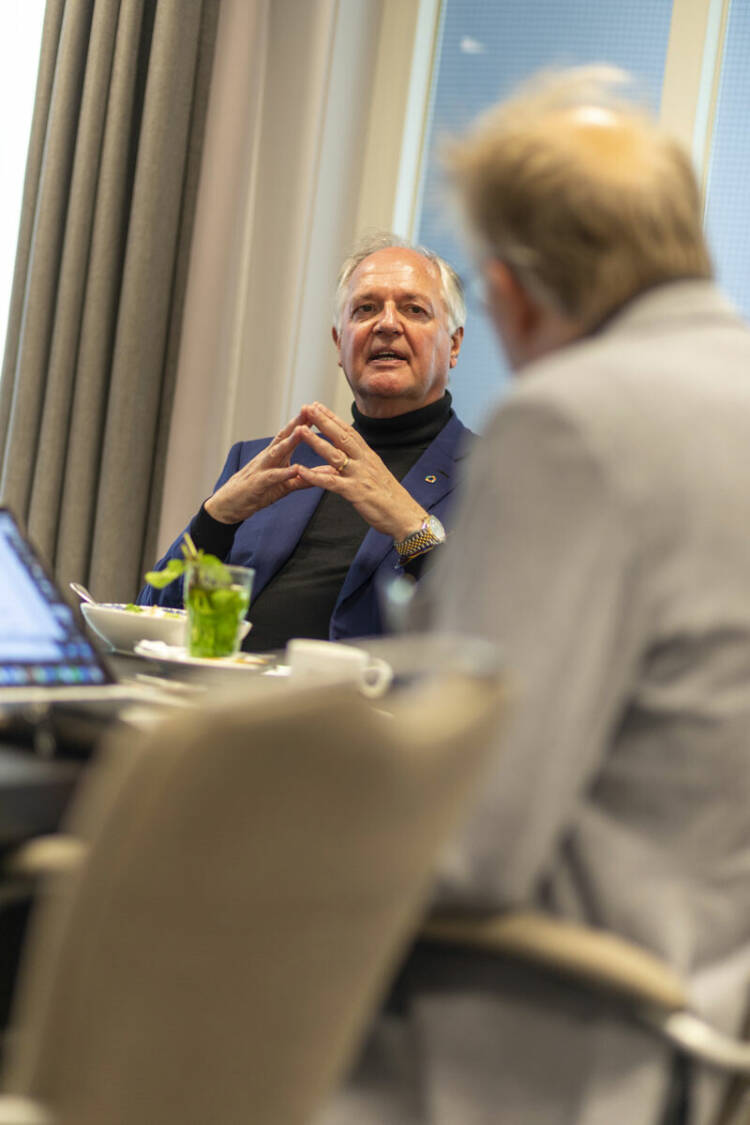
The debate is also increasingly about doing business within the planetary boundaries.
“We’re understanding now that we’re close to negative tipping points. We've never been this close before. As you know, the oceans are important in combating climate change – they absorb 80% of our CO2. But the current situation is causing acidification, which is destroying coral reefs and threatening entire fish stocks. The melting of polar ice, the release of methane that is 25 times more harmful to warming than CO2. And I haven’t even touched upon the disappearance of flora and fauna. 68% of all wildlife has disappeared in the last fifty years. Only now are we understanding the magnitude of our problems. Everything is connected and we’re starting to realize the urgency of the situation.
Our eyes are opening to the fact that the jungle in the Amazon – which is deforested at two football fields per second – is approaching a negative turning point: the point is approaching that the jungle will no longer absorb CO2 but start emitting it. Once a tipping point is reached, these negative effects are very difficult to control. The richer parts of the world are robust and have the money for the necessary adjustments, but many other people in the world are going to pay the bill. Fortunately, we also realize that solutions are within our reach. After COVID-19, we saw that a trillion dollars is normal for aiding programs like improving infrastructure in the US. With less money we can solve the issues of inequality and the planet. But if we don't make fundamental progress in the next ten to fifteen years, the price we have to pay will be much higher.”
"For too long we've made marginal improvements that don't seem to work; the system is pushing back because we don't see any progress. Today, we see more courageous people rising up who want to engage in important discussion. How do you make the financial market serve the real economy again? How do you get the financial market to think long term? How do you value social and ecological capital? How do you organize transparency, so that companies and people can be held accountable? Should companies only answer to shareholders or to all stakeholders? I strongly believe in the latter. These fundamental debates are taking place today.”
The next ten years are said to be the most important decade of mankind. What’s your view on that statement?
“I would rather say: the next decade will define our future. Each decade can be characterized in one area or the other, as the most important in history. But this decade will be decisive. There is a small window of opportunity to evolve capitalism into a system that works better for many more people and for the entire planet. We need to introduce a new definition of success and start measuring it. We need to broaden the narrow definition of Gross Domestic Product or profit and include the well-being of all stakeholders. We should move away from the reward on capital that too few people benefit from. Citizens have been aware of these problems for a while, but we can now see that the financial market, companies and responsible governments are ready to think about what major changes need to take place in our system."

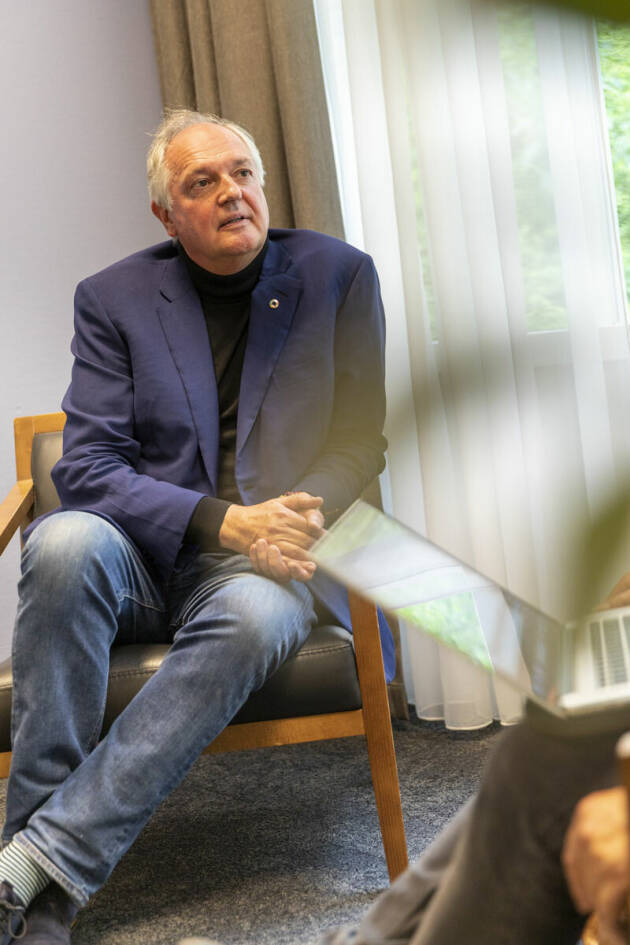

Captain Planet (Polman’s nickname)
“I've always been concerned about inequality and climate change. In 2015 I received the United Nations' highest honor – the Champions of the Earth Award. I think that's where the nickname comes from. Captain Planet is a cartoon character in the US. I don’t object to this nickname. I use it as an avatar. What are your superpowers to make the Earth better and what can you do? It's not that I'm better than anyone else, but sometimes you get into positions that allow you to exert more influence. When I was CEO of Unilever, I had the opportunity to positively impact more lives than when I wasn't there. I've always thought that if we did the right thing for 'people' and 'planet', then success for Unilever would follow. And that was right. What can we do to improve the faith of people in India and Africa, sustainably? If we figure that out first, there are plenty of smart people who can then turn it profitable.”


Enschede (hometown of Polman, city in The Netherlands)
“My father always said: don't forget the number of your house. I've had fantastic parents, they laid the foundations for the rest of my life. My primary and secondary school, the Carmelite Fathers at Jacobus College, also shaped me. Just like my circle of friends from that time, whom we still get together with, once a year. Whether my True North is in Enschede? I'm proud to be a tukker (Dutch word for people from the area of Enschede). You should keep two feet on the ground. You have to stay down to earth, it's not about me. My grandmother always said: 'actions speak louder than words'. Work hard, just keep going, do the things you need to do in a simple way. Don't make promises, just work."
The United Nations Sustainable Development Goals (SDGs)
“The best business plan ever presented to humanity on a silver platter. Implementing SDGs in your business provides much more opportunities than many companies could imagine. But you have to be able to understand the goals. The framework also functions as a moral compass. You can say that the SDGs showcase humanity’s shortcomings, on the other side they show the possibilities that the framework offers. For the first time in history there’s a universal plan to permanently eradicate poverty in a sustainable and reasonable way. The starting point is - to put it simply: 'Leave no one behind'. If you want the world to function properly, you can't leave anyone behind. That doesn’t mean that everyone has an equal position, but you shouldn't leave anyone behind. In any system in which people don’t participate or are abandoned, rebellion arises. Discontent in the streets is already visible in the streets. The SDGs are a beacon that everyone should familiarize themselves with.”
Economist Milton Friedman (promoter of unadulterated capitalism with minimal government intervention)
“First thing that comes to mind? Milton Friedman is dead. And that observation is also meant symbolically. My second hunch is, if Milton Friedman was born today, he wouldn't be writing the same book with the same ideas as he did back then. The issues in his time were fundamentally different. Businesses were much more locally oriented and governments functioned better. Many issues of today – such as increasing inequality and working within planetary boundaries – moved in the right direction then. Friedman would now see that the best way to build shareholder value is to take care of all your stakeholders.”

Let's start with your response to some keywords:
Paul Polman, Unilever’s CEO from 2008 to 2019. He’s known for his huge work ethic and commitment to sustainability. Today he is active with his foundation, Imagine, that aims to save the world from inequality, climate change and loss of biodiversity. Companies, especially food companies, have a special responsibility, according to Polman. His book 'Net Positive — How courageous companies thrive by giving more than they take’ has just been published. Hans Steenbergen spoke with him exclusively for Food Inspiration.
Hans Steenbergen Nathalie Brugman Xiao Er Kong

Navigate to ‘True North’
Former CEO of Unilever Paul Polman on true leadership
14 min
